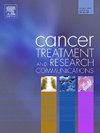Very first real-world data on zongertinib use in non-small cell lung cancer patients with HER2 mutations: A brief report
Q3 Medicine
引用次数: 0
Abstract
Introduction
Treatment options for HER2-mutant patients with non-small cell lung cancer (NSCLC) are limited. New agents, including zongertinib, a HER2-selective tyrosine kinase inhibitor (TKI), are being investigated in clinical trials. However, published clinical data on the efficacy and safety of zongertinib are limited to data from a single phase I trial including only 36 patients with NSCLC.
Methods
We report real-world data on six consecutive patients with HER2-mutant NSCLC who received zongertinib through a named patient use program between December 2023 and June 2024. Radiological response evaluation and blood testing were routinely performed every two to three months, and adverse events were graded according to the Common Terminology Criteria for Adverse Events (CTCAE) version 5.
Results
All patients were diagnosed with a metastatic adenocarcinoma, had previously progressed on at least one line of chemotherapy and had been previously treated with trastuzumab-deruxtecan (two had to stop treatment because of pneumonitis). Three patients (50%) presented with an Eastern Cooperative Oncology Group (ECOG) performance status of ≥2. A clinical and radiological benefit was achieved in all patients (complete response (1), partial response (4), and stable disease (1)). In one patient with brain metastases, a complete response was achieved. Treatment with zongertinib is ongoing in all patients. Adverse events were reported in one patient (elevated blood pressure (grade 1).
Conclusion
Zongertinib may be an effective and well-tolerated treatment option for HER2-mutant NSCLC patients even if they are heavily pretreated, have a reduced performance status or have a history of pneumonitis and brain metastases.
求助全文
约1分钟内获得全文
求助全文
来源期刊

Cancer treatment and research communications
Medicine-Oncology
CiteScore
4.30
自引率
0.00%
发文量
148
审稿时长
56 days
期刊介绍:
Cancer Treatment and Research Communications is an international peer-reviewed publication dedicated to providing comprehensive basic, translational, and clinical oncology research. The journal is devoted to articles on detection, diagnosis, prevention, policy, and treatment of cancer and provides a global forum for the nurturing and development of future generations of oncology scientists. Cancer Treatment and Research Communications publishes comprehensive reviews and original studies describing various aspects of basic through clinical research of all tumor types. The journal also accepts clinical studies in oncology, with an emphasis on prospective early phase clinical trials. Specific areas of interest include basic, translational, and clinical research and mechanistic approaches; cancer biology; molecular carcinogenesis; genetics and genomics; stem cell and developmental biology; immunology; molecular and cellular oncology; systems biology; drug sensitivity and resistance; gene and antisense therapy; pathology, markers, and prognostic indicators; chemoprevention strategies; multimodality therapy; cancer policy; and integration of various approaches. Our mission is to be the premier source of relevant information through promoting excellence in research and facilitating the timely translation of that science to health care and clinical practice.
 求助内容:
求助内容: 应助结果提醒方式:
应助结果提醒方式:


